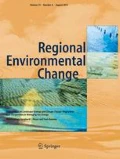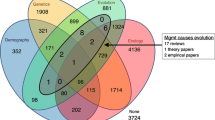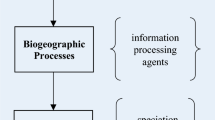Abstract
A challenge for eco-evolutionary research is to better understand the effect of climate and landscape changes on species and their distribution. Populations of species can respond to changes in their environment through local genetic adaptation or plasticity, dispersal, or local extinction. The individual-based modeling (IBM) approach has been repeatedly applied to assess organismic responses to environmental changes. IBMs simulate emerging adaptive behaviors from the basic entities upon which both ecological and evolutionary mechanisms act. The objective of this review is to summarize the state of the art of eco-evolutionary IBMs and to explore to what degree they already address the key responses of organisms to environmental change. In this, we identify promising approaches and potential knowledge gaps in the implementation of eco-evolutionary mechanisms to motivate future research. Using mainly the ISI Web of Science, we reveal that most of the progress in eco-evolutionary IBMs in the last decades was achieved for genetic adaptation to novel local environmental conditions. There is, however, not a single eco-evolutionary IBM addressing the three potential adaptive responses simultaneously. Additionally, IBMs implementing adaptive phenotypic plasticity are rare. Most commonly, plasticity was implemented as random noise or reaction norms. Our review further identifies a current lack of models where plasticity is an evolving trait. Future eco-evolutionary models should consider dispersal and plasticity as evolving traits with their associated costs and benefits. Such an integrated approach could help to identify conditions promoting population persistence depending on the life history strategy of organisms and the environment they experience.


Similar content being viewed by others
References
Acerbi A, Jacquet PO, Tennie C (2012) Behavioral constraints and the evolution of faithful social learning. Curr Zool 58:307–318. https://doi.org/10.1093/czoolo/58.2.307
Aguilee R, Claessen D, Lambert A (2013) Adaptive radiation driven by the interplay of eco-evolutionary and landscape dynamics. Evolution 67:1291–1306. https://doi.org/10.1111/evo.12008
Ayllón D, Railsback SF, Vincenzi S, Groeneveld J, Almodóvar A, Grimm V (2016) InSTREAM-Gen: modelling eco-evolutionary dynamics of trout populations under anthropogenic environmental change. Ecol Model 326:36–53. https://doi.org/10.1016/j.ecolmodel.2015.07.026
Barfield M, Holt RD (2016) Evolutionary rescue in novel environments: towards improving predictability. Evol Ecol Res 17:771–786
Barraquand F, Murrell DJ (2012) Intense or spatially heterogeneous predation can select against prey dispersal. PLoS One 7:e28924. https://doi.org/10.1371/journal.pone.0028924
Birand A, Vose A, Gavrilets S (2012) Patterns of species ranges, speciation, and extinction. Am Nat 179:1–21. https://doi.org/10.1086/663202
Björklund M, Ranta E, Kaitala V, Bach LA, Lundberg P, Stenseth NC (2009) Quantitative trait evolution and environmental change. PLoS One 4:e4521. https://doi.org/10.1371/journal.pone.0004521
Boag PT, Grant PR (1981) Intense natural selection in a population of Darwin’s finches (Geospizinae) in the Galápagos. Science 214:82–85. https://doi.org/10.1126/science.214.4516.82
Bocedi G, Palmer SCF, Pe’er G, Heikkinen RK, Matsinos YG, Watts K, Travis JMJ (2014) RangeShifter: a platform for modelling spatial eco-evolutionary dynamics and species’ responses to environmental changes. Methods Ecol Evol 5:388–396. https://doi.org/10.1111/2041-210X.12162
Bolnick DI, Amarasekare P, Araújo MS, Bürger R, Levine JM, Novak M, Rudolf VHW, Schreiber SJ, Urban MC, Vasseur DA (2011) Why intraspecific trait variation matters in community ecology. Trends Ecol Evol 26:183–192. https://doi.org/10.1016/j.tree.2011.01.009
Bonte D, Hovestadt T, Poethke H-J (2010) Evolution of dispersal polymorphism and local adaptation of dispersal distance in spatially structured landscapes. Oikos 119:560–566. https://doi.org/10.1111/j.1600-0706.2009.17943.x
Boutin S, Lane JE (2014) Climate change and mammals: evolutionary versus plastic responses. Evol Appl 7:29–41. https://doi.org/10.1111/eva.12121
Bridle JR, Polechová J, Kawata M, Butlin RK (2010) Why is adaptation prevented at ecological margins? New insights from individual-based simulations. Ecol Lett 13:485–494. https://doi.org/10.1111/j.1461-0248.2010.01442.x
Brook BW, Sodhi NS, Bradshaw CJA (2008) Synergies among extinction drivers under global change. Trends Ecol Evol 23:453–460. https://doi.org/10.1016/j.tree.2008.03.011
Bulmer MG (1971) The effect of selection on genetic variability. Am Nat 105:201–211. https://doi.org/10.1086/282718
Bush A, Mokany K, Catullo R, Hoffmann A, Kellermann V, Sgrò C, McEvey S, Ferrier S, Coulson T (2016) Incorporating evolutionary adaptation in species distribution modelling reduces projected vulnerability to climate change. Ecol Lett 19:1468–1478. https://doi.org/10.1111/ele.12696
Campos D, Llebot JE, Méndez V (2008) Limited resources and evolutionary learning may help to understand the mistimed reproduction in birds caused by climate change. Theor Popul Biol 74:16–21. https://doi.org/10.1016/j.tpb.2008.04.002
Chaianunporn T, Hovestadt T (2012) Concurrent evolution of random dispersal and habitat niche width in host-parasitoid systems. Ecol Model 247:241–250. https://doi.org/10.1016/j.ecolmodel.2012.09.005
Charmantier A, Gienapp P (2014) Climate change and timing of avian breeding and migration: evolutionary versus plastic changes. Evol Appl 7:15–28. https://doi.org/10.1111/eva.12126
Chevin L-M, Lande R, Mace GM (2010) Adaptation, plasticity, and extinction in a changing environment: towards a predictive theory. PLoS Biol 8:e1000357. https://doi.org/10.1371/journal.pbio.1000357
Clark JR, Daines SJ, Lenton TM, Watson AJ, Williams HTP (2011) Individual-based modelling of adaptation in marine microbial populations using genetically defined physiological parameters. Ecol Model 222:3823–3837. https://doi.org/10.1016/j.ecolmodel.2011.10.001
Cobben MMP, Mitesser O, Kubisch A (2017) Evolving mutation rate advances the invasion speed of a sexual species. BMC Evol Biol 17:150. https://doi.org/10.1186/s12862-017-0998-8
Coleman JS, McConnaughay KDM, Ackerly DD (1994) Interpreting phenotypic variation in plants. Trends Ecol Evol 9:187–191. https://doi.org/10.1016/0169-5347(94)90087-6
Collins S, Rost B, Rynearson TA (2014) Evolutionary potential of marine phytoplankton under ocean acidification. Evol Appl 7:140–155. https://doi.org/10.1111/eva.12120
Crone EE, Ellis MM, Morris WF, Stanley A, Bell T, Bierzychudek P, Ehrlén J, Kaye TN, Knight TM, Lesica P, Oostermeijer G, Quintana-Ascencio PF, Ticktin T, Valverde T, Williams JL, Doak DF, Ganesan R, Mceachern K, Thorpe AS, Menges ES (2013) Ability of matrix models to explain the past and predict the future of plant populations. Conserv Biol 27:968–978. https://doi.org/10.1111/cobi.12049
Crozier LG, Hutchings JA (2014) Plastic and evolutionary responses to climate change in fish. Evol Appl 7:68–87. https://doi.org/10.1111/eva.12135
DeAngelis DL, Grimm V (2014) Individual-based models in ecology after four decades. F1000Prime Rep 6:39. https://doi.org/10.12703/P6-39
DeAngelis DL, Mooij WM (2005) Individual-based modeling of ecological and evolutionary processes. Annu Rev Ecol Evol Syst 36:147–168. https://doi.org/10.1146/annurev.ecolsys.36.102003.152644
DeWitt TJ, Sih A, Wilson DS (1998) Costs and limits of phenotypic plasticity. Trends Ecol Evol 13:77–81. https://doi.org/10.1016/S0169-5347(97)01274-3
Downing K (1998) Using evolutionary computational techniques in environmental modelling. Environ Model Softw 13:519–528. https://doi.org/10.1016/S1364-8152(98)00050-4
Dunlop ES, Shuter BJ, Dieckmann U (2007) Demographic and evolutionary consequences of selective mortality: predictions from an eco-genetic model for smallmouth bass. Trans Am Fish Soc 136:749–765. https://doi.org/10.1577/T06-126.1
Dunlop ES, Heino M, Dieckmann U (2009) Eco-genetic modeling of contemporary life-history evolution. Ecol Appl 19:1815–1834. https://doi.org/10.1890/08-1404.1
Dytham C (2009) Evolved dispersal strategies at range margins. Proc R Soc B 276:1407–1413. https://doi.org/10.1098/rspb.2008.1535
Dytham C, Travis JMJ, Mustin K, Benton TG (2014) Changes in species’ distributions during and after environmental change: which eco-evolutionary processes matter more? Ecography 37:1210–1217. https://doi.org/10.1111/ecog.01194
Elith J, Leathwick JR (2009) Species distribution models: ecological explanation and prediction across space and time. Annu Rev Ecol Evol Syst 40:677–697. https://doi.org/10.1146/annurev.ecolsys.110308.120159
Eyre-Walker A, Keightley PD (2007) The distribution of fitness effects of new mutations. Nat Rev Genet 8:610–618. https://doi.org/10.1038/nrg2146
Fleeming J (1867) (Review of) “The origin of species”. North Br Rev 46:277–318
Franks SJ, Weber JJ, Aitken SN (2014) Evolutionary and plastic responses to climate change in terrestrial plant populations. Evol Appl 7:123–139. https://doi.org/10.1111/eva.12112
Fronhofer EA, Kubisch A, Hilker FM, Hovestadt T, Poethke HJ (2012) Why are metapopulations so rare? Ecology 93:1967–1978. https://doi.org/10.1890/11-1814.1
Fronhofer EA, Nitsche N, Altermatt F (2017) Information use shapes the dynamics of range expansions into environmental gradients. Glob Ecol Biogeogr 26:400–411. https://doi.org/10.1111/geb.12547
Fussmann GF, Ellner SP, Hairston NG (2003) Evolution as a critical component of plankton dynamics. Proc R Soc B 270:1015–1022. https://doi.org/10.1098/rspb.2003.2335
Galloway LF, Etterson JR (2007) Transgenerational plasticity is adaptive in the wild. Science 318:1134–1136. https://doi.org/10.1126/science.1148766
Gilbert KJ, Whitlock MC (2017) The genetics of adaptation to discrete heterogeneous environments: frequent mutation or large-effect alleles can allow range expansion. J Evol Biol 30:591–602. https://doi.org/10.1111/jeb.13029
Gilman RT, Behm JE (2011) Hybridization, species collapse, and species reemergence after disturbance to premating mechanisms of reproductive isolation. Evolution 65:2592–2605. https://doi.org/10.1111/j.1558-5646.2011.01320.x
Golestani A, Gras R, Cristescu M (2012) Speciation with gene flow in a heterogeneous virtual world: can physical obstacles accelerate speciation? Proc R Soc B 279:3055–3064. https://doi.org/10.1098/rspb.2012.0466
Gonzalez A, Ronce O, Ferriere R, Hochberg ME (2013) Evolutionary rescue: an emerging focus at the intersection between ecology and evolution. Philos Trans R Soc B Biol Sci 368:20120404. https://doi.org/10.1098/rstb.2012.0404
Green DM (2009) Coevolution of dispersal in a parasitoid–host system. Popul Ecol 51:253–260. https://doi.org/10.1007/s10144-008-0131-3
Griebeler EM, Caprano T, Böhning-Gaese K (2010) Evolution of avian clutch size along latitudinal gradients: do seasonality, nest predation or breeding season length matter? J Evol Biol 23:888–901. https://doi.org/10.1111/j.1420-9101.2010.01958.x
Guttal V, Couzin ID (2010) Social interactions, information use, and the evolution of collective migration. Proc Natl Acad Sci 107:16172–16177. https://doi.org/10.1073/pnas.1006874107
Haller BC, Mazzucco R, Dieckmann U (2013) Evolutionary branching in complex landscapes. Am Nat 182:E127–E141. https://doi.org/10.1086/671907
Hanski I, Heino M (2003) Metapopulation-level adaptation of insect host plant preference and extinction–colonization dynamics in heterogeneous landscapes. Theor Popul Biol 64:281–290. https://doi.org/10.1016/S0040-5809(03)00093-5
Haythorne S, Skabar A (2013) An improved pattern-guided evolution approach for the development of adaptive individual-based ecological models. Ecol Model 252:72–82. https://doi.org/10.1016/j.ecolmodel.2012.09.002
Heino M, Hanski I (2001) Evolution of migration rate in a spatially realistic metapopulation model. Am Nat 157:495–511. https://doi.org/10.1086/319927
Hendry AP (2016) Key questions on the role of phenotypic plasticity in eco-evolutionary dynamics. J Hered 107:25–41. https://doi.org/10.1093/jhered/esv060
Hill WG, Kirkpatrick M (2010) What animal breeding has taught us about evolution. Annu Rev Ecol Evol Syst 41:1–19. https://doi.org/10.1146/annurev-ecolsys-102209-144728
Holt RD, Barfield M (2011) Theoretical perspectives on the statics and dynamics of species’ borders in patchy environments. Am Nat 178:S6–S25. https://doi.org/10.1086/661784
Jager HI (2001) Individual variation in life history characteristics can influence extinction risk. Ecol Model 144:61–76. https://doi.org/10.1016/S0304-3800(01)00362-3
Jeltsch F, Moloney KA, Schurr FM, Köchy M, Schwager M (2008) The state of plant population modelling in light of environmental change. Perspect Plant Ecol Evol Syst 9:171–189. https://doi.org/10.1016/j.ppees.2007.11.004
Jeltsch F, Moloney KA, Schwager M, Körner K, Blaum N (2011) Consequences of correlations between habitat modifications and negative impact of climate change for regional species survival. Agric Ecosyst Environ 145:49–58. https://doi.org/10.1016/j.agee.2010.12.019
Johnston RF, Selander RK (1964) House sparrows: rapid evolution of races in North America. Science 144:548–550. https://doi.org/10.1126/science.144.3618.548
Katsnelson E, Motro U, Feldman MW, Lotem A (2012) Evolution of learned strategy choice in a frequency-dependent game. Proc R Soc B 279:1176–1184. https://doi.org/10.1098/rspb.2011.1734
Kearney M, Porter WP, Williams C, Ritchie S, Hoffmann AA (2009) Integrating biophysical models and evolutionary theory to predict climatic impacts on species’ ranges: the dengue mosquito Aedes aegypti in Australia. Funct Ecol 23:528–538. https://doi.org/10.1111/j.1365-2435.2008.01538.x
Kronholm I, Collins S (2016) Epigenetic mutations can both help and hinder adaptive evolution. Mol Ecol 25:1856–1868. https://doi.org/10.1111/mec.13296
Kubisch A, Hovestadt T, Poethke H-J (2010) On the elasticity of range limits during periods of expansion. Ecology 91:3094–3099. https://doi.org/10.1890/09-2022.1
Laland KN, Odling-Smee FJ, Feldman MW (1999) Evolutionary consequences of niche construction and their implications for ecology. Proc Natl Acad Sci 96:10242–10247. https://doi.org/10.1073/pnas.96.18.10242
Laland KN, Uller T, Feldman MW, Sterelny K, Müller GB, Moczek A, Jablonka E, Odling-Smee J (2015) The extended evolutionary synthesis: its structure, assumptions and predictions. Proc R Soc B 282:20151019. https://doi.org/10.1098/rspb.2015.1019
Lande R (2014) Evolution of phenotypic plasticity and environmental tolerance of a labile quantitative character in a fluctuating environment. J Evol Biol 27:866–875. https://doi.org/10.1111/jeb.12360
Litchman E, Klausmeier CA (2008) Trait-based community ecology of phytoplankton. Annu Rev Ecol Evol Syst 39:615–639. https://doi.org/10.1146/annurev.ecolsys.39.110707.173549
Lohbeck KT, Riebesell U, Reusch TBH (2012) Adaptive evolution of a key phytoplankton species to ocean acidification. Nat Geosci 5:346–351. https://doi.org/10.1038/ngeo1441
Lynch M, Walsh B (1998) Genetics and analysis of quantitative traits. Sinauer, Sunderland
Merico A, Brandt G, Smith SL, Oliver M (2014) Sustaining diversity in trait-based models of phytoplankton communities. Front Ecol Evol 2:59. https://doi.org/10.3389/fevo.2014.00059
Merow C, Dahlgren JP, Metcalf CJ, Childs DZ, Evans ME, Jongejans E, Record S, Rees M, Salguero-Gómez R, McMahon SM, Ramula S (2014) Advancing population ecology with integral projection models: a practical guide. Methods Ecol Evol 5:99–110. https://doi.org/10.1111/2041-210X.12146
Miner BG, Sultan SE, Morgan SG, Padilla DK, Relyea RA (2005) Ecological consequences of phenotypic plasticity. Trends Ecol Evol 20:685–692. https://doi.org/10.1016/j.tree.2005.08.002
Mokany K, Ferrier S, Connolly SR, Dunstan PK, Fulton EA, Harfoot MB, Harwood TD, Richardson AJ, Roxburgh SH, Scharlemann JP, Tittensor DP, Westcott DA, Wintle BA (2015) Integrating modelling of biodiversity composition and ecosystem function. Oikos 125:10–19. https://doi.org/10.1111/oik.02792
Moustakas A, Evans MR (2013) Integrating evolution into ecological modelling: accommodating phenotypic changes in agent based models. PLoS One 8:e71125. https://doi.org/10.1371/journal.pone.0071125
Moya-Laraño J, Verdeny-Vilalta O, Rowntree J, Melguizo-Ruiz N, Montserrat M, Laiolo P (2012) Chapter 1 - Climate change and eco-evolutionary dynamics in food webs. Adv Ecol Res 47:1–80. https://doi.org/10.1016/B978-0-12-398315-2.00001-6
Nonaka E, Brännström Å, Svanbäck R (2014) Assortative mating can limit the evolution of phenotypic plasticity. Evol Ecol 28:1057–1074. https://doi.org/10.1007/s10682-014-9728-5
North A, Cornell S, Ovaskainen O (2011) Evolutionary responses of dispersal distance to landscape structure and habitat loss. Evolution 65:1739–1751. https://doi.org/10.1111/j.1558-5646.2011.01254.x
Nussey DH, Postma E, Gienapp P, Visser ME (2005) Selection on heritable phenotypic plasticity in a wild bird population. Science 310:304–306. https://doi.org/10.1126/science.1117004
Oddou-Muratorio S, Davi H (2014) Simulating local adaptation to climate of forest trees with a Physio-demo-genetics model. Evol Appl 7:453–467. https://doi.org/10.1111/eva.12143
Phillips BL (2012) Range shift promotes the formation of stable range edges. J Biogeogr 39:153–161. https://doi.org/10.1111/j.1365-2699.2011.02597.x
Picó FX, Quintana-Ascencio PF, Mildén M, Ehrlén J, Pfingsten I (2009) Modelling the effects of genetics and habitat on the demography of a grassland herb. Basic Appl Ecol 10:122–130. https://doi.org/10.1016/j.baae.2008.02.006
Pigliucci M (2005) Evolution of phenotypic plasticity: where are we going now? Trends Ecol Evol 20:481–486. https://doi.org/10.1016/j.tree.2005.06.001
Poethke HJ, Dytham C, Hovestadt T (2011) A metapopulation paradox: partial improvement of habitat may reduce metapopulation persistence. Am Nat 177:792–799. https://doi.org/10.1086/659995
Rebaudo F, Le Rouzic A, Dupas S, Silvain J-F, Harry M, Dangles O (2013) SimAdapt: an individual-based genetic model for simulating landscape management impacts on populations. Methods Ecol Evol 4:595–600. https://doi.org/10.1111/2041-210X.12041
Reed TE, Schindler DE, Hague MJ, Patterson DA, Meir E, Waples RS, Hinch SG (2011) Time to evolve? Potential evolutionary responses of Fraser River sockeye Salmon to climate change and effects on persistence. PLoS One 6:e20380. https://doi.org/10.1371/journal.pone.0020380
Relyea RA (2002) Costs of phenotypic plasticity. Am Nat 159:272–282. https://doi.org/10.1086/338540
Romero-Mujalli D, Cappelletto J, Herrera EA, Tárano Z (2017) The effect of social learning in a small population facing environmental change: an agent-based simulation. J Ethol 35:61–73. https://doi.org/10.1007/s10164-016-0490-8
Sadedin S, Hollander J, Panova M, Johannesson K, Gavrilets S (2009) Case studies and mathematical models of ecological speciation. 3: ecotype formation in a Swedish snail. Mol Ecol 18:4006–4023. https://doi.org/10.1111/j.1365-294X.2009.04320.x
Schilthuizen M, Kellermann V (2014) Contemporary climate change and terrestrial invertebrates: evolutionary versus plastic changes. Evol Appl 7:56–67. https://doi.org/10.1111/eva.12116
Schmitt J, Stinchcombe JR, Heschel MS, Huber H (2003) The adaptive evolution of plasticity: phytochrome-mediated shade avoidance Responses1. Integr Comp Biol 43:459–469. https://doi.org/10.1093/icb/43.3.459
Schweitzer JA, Juric I, van de Voorde TFJ, Clay K, van der Putten WH, Bailey JK (2014) Are there evolutionary consequences of plant–soil feedbacks along soil gradients? Funct Ecol 28:55–64. https://doi.org/10.1111/1365-2435.12201
Shefferson RP, Salguero-Gómez R (2015) Eco-evolutionary dynamics in plants: interactive processes at overlapping time-scales and their implications. J Ecol 103:789–797. https://doi.org/10.1111/1365-2745.12432
Stillman RA, Railsback SF, Giske J, Berger U, Grimm V (2015) Making predictions in a changing world: the benefits of individual-based ecology. Bioscience 65:140–150. https://doi.org/10.1093/biosci/biu192
Stoks R, Geerts AN, De Meester L (2014) Evolutionary and plastic responses of freshwater invertebrates to climate change: realized patterns and future potential. Evol Appl 7:42–55. https://doi.org/10.1111/eva.12108
Thériault V, Dunlop ES, Dieckmann U, Bernatchez L, Dodson JJ (2008) The impact of fishing-induced mortality on the evolution of alternative life-history tactics in brook charr. Evol Appl 1:409–423. https://doi.org/10.1111/j.1752-4571.2008.00022.x
Travis JMJ, Smith HS, Ranwala SMW (2010) Towards a mechanistic understanding of dispersal evolution in plants: conservation implications. Divers Distrib 16:690–702. https://doi.org/10.1111/j.1472-4642.2010.00674.x
Travis JMJ, Mustin K, Bartoń KA, Benton TG, Clobert J, Delgado MM, Dytham C, Hovestadt T, Palmer SCF, Van Dyck H, Bonte D (2012) Modelling dispersal: an eco-evolutionary framework incorporating emigration, movement, settlement behaviour and the multiple costs involved. Methods Ecol Evol 3:628–641. https://doi.org/10.1111/j.2041-210X.2012.00193.x
Urban MC, De Meester L (2009) Community monopolization: local adaptation enhances priority effects in an evolving metacommunity. Proc R Soc B 276:4129–4138. https://doi.org/10.1098/rspb.2009.1382
Urban MC, Richardson JL, Freidenfelds NA (2014) Plasticity and genetic adaptation mediate amphibian and reptile responses to climate change. Evol Appl 7:88–103. https://doi.org/10.1111/eva.12114
van der Post DJ, Semmann D (2011) Local orientation and the evolution of foraging: changes in decision making can eliminate evolutionary trade-offs. PLoS Comput Biol 7:e1002186. https://doi.org/10.1371/journal.pcbi.1002186
Vincenzi S (2014) Extinction risk and eco-evolutionary dynamics in a variable environment with increasing frequency of extreme events. J R Soc Interface 11:20140441. https://doi.org/10.1098/rsif.2014.0441
Vincenzi S, Piotti A (2014) Evolution of serotiny in maritime pine (Pinus pinaster) in the light of increasing frequency of fires. Plant Ecol 215:689–701. https://doi.org/10.1007/s11258-014-0342-y
Vincenzi S, Crivelli AJ, Satterthwaite WH, Mangel M (2014) Eco-evolutionary dynamics induced by massive mortality events. J Fish Biol 85:8–30. https://doi.org/10.1111/jfb.12382
Wang H-Y, Höök TO (2009) Eco-genetic model to explore fishing-induced ecological and evolutionary effects on growth and maturation schedules. Evol Appl 2:438–455. https://doi.org/10.1111/j.1752-4571.2009.00088.x
West-Eberhard MJ (2003) Developmental plasticity and evolution. Oxford University Press, New York
Wiens JJ (2016) Climate-related local extinctions are already widespread among plant and animal species. PLoS Biol 14:e2001104. https://doi.org/10.1371/journal.pbio.2001104
Wolfe KH, Sharp PM, Li W-H (1989) Mutation rates differ among regions of the mammalian genome. Nature 337:283–285. https://doi.org/10.1038/337283a0
Yoshida T, Jones LE, Ellner SP, Fussmann GF, Hairston NG (2003) Rapid evolution drives ecological dynamics in a predator-prey system. Nature 424:303–306. https://doi.org/10.1038/nature01767
Zheng C, Ovaskainen O, Hanski I (2009) Modelling single nucleotide effects in phosphoglucose isomerase on dispersal in the Glanville fritillary butterfly: coupling of ecological and evolutionary dynamics. Philos Trans R Soc B Biol Sci 364:1519–1532. https://doi.org/10.1098/rstb.2009.0005
Acknowledgements
We thank the research group of Plant Ecology and Nature Conservation of the University of Potsdam for their valuable comments on the manuscript.
Funding
This work was funded by the University of Potsdam.
Author information
Authors and Affiliations
Corresponding author
Additional information
Editor:Wolfgang Cramer
Rights and permissions
About this article
Cite this article
Romero-Mujalli, D., Jeltsch, F. & Tiedemann, R. Individual-based modeling of eco-evolutionary dynamics: state of the art and future directions. Reg Environ Change 19, 1–12 (2019). https://doi.org/10.1007/s10113-018-1406-7
Received:
Accepted:
Published:
Issue Date:
DOI: https://doi.org/10.1007/s10113-018-1406-7




